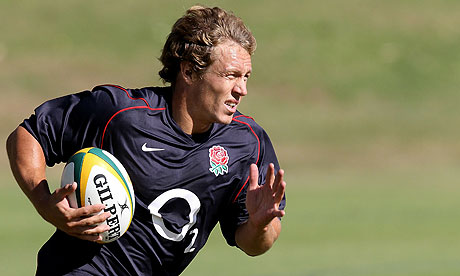
I am lucky: I get to play the game that I love every day. To sustain this level of activity, I need to drink and eat well. As my job requires my body to be at its best at all times, I have developed a dietary routine that I tend to stick to most days.
Breakfast
Water. Your body is at its most dehydrated in the morning. Considering that you have spent eight hours without any intake of fluids while you have been sleeping, it is a good idea to start the day with a drink of water to make sure you are hydrated from the outset.
Muesli with fruit. One of your five-a-day, and also thought to help lower blood cholesterol concentration.
Low-fat skimmed milk. I tend to steer clear of high-fat foods.
Eggs/egg-white omelettes. Egg whites are fat-free and rich in high-quality protein. I try to have high-protein foods at every meal.
Carbs. You need energy at all points during the day, so carbohydrates such as toast or porridge could be incorporated into your morning routine.
Lunch
Fruit, protein, salad. I tend to keep my lunch healthy and simple.
Healthy fats. I often eat avocado - it contains monounsaturated fat and is great for energy release throughout the day.
Carbs. Carbohydrates such as pasta and potatoes make sure your energy levels are at performance level for the rest of the day.
Beetroot. Beet greens are a very good source of calcium, iron, and vitamins A and C. Beetroots are an excellent source of folic acid, which helps you rebuild your body after training.
During training
Water. I take on water whenever possible, especially since moving to France, to make sure my body is fully hydrated and in tip-top condition. I keep a Volvic bottle with me and take sips little and often. This technique has made the challenge of drinking 1.5 litres a day really easy.
Dinner
Few carbs. In the evening it is best to avoid a high intake of carbohydrates, as they will release energy during the night that could affect your sleep.
Oily fish and chicken. I love eating out and normally order chicken or oily fish, as they are an essential source of Omega 3, protein, vitamins and minerals.
Recovering from injury
Unfortunately, injuries are something that I have had a little bit of experience with. Immediate physical treatment is necessary to reduce the swelling and avoid further injury, such as elevating the injury above the heart and applying ice to the affected area. Your immediate mental response to injury, however, can often be more important than your physical response, because it sets you up for your long-term attitude towards recovery.
Something I have learned is that remaining positive is one of the best things that you can do to aid recovery. You can often tell how bad an injury is the second that it happens, and remaining positive is extremely important. Even when I am in pain and shock I try to block out any negative thoughts. Combating the initial stress can be really hard, but staying open-minded and focusing on recovery, rather than worrying, is the best way to avoid "locking in" any negative feelings that can linger throughout your recovery period.
Modern medicine can work wonders if you are in the right frame of mind and do everything possible to help out the doctors. When I sustained an ankle injury before the 2007 World Cup, many people wrote me off for the entire tournament. Thanks to the great work by the medical staff and physiotherapy team, and by doing everything I possibly could to aid my own recovery, I ended up missing just two games of the championships. I was back playing weeks before most people thought I would be.
I put this down to the positive approach that I took to my recovery, which helped me heal at the fastest possible rate.

